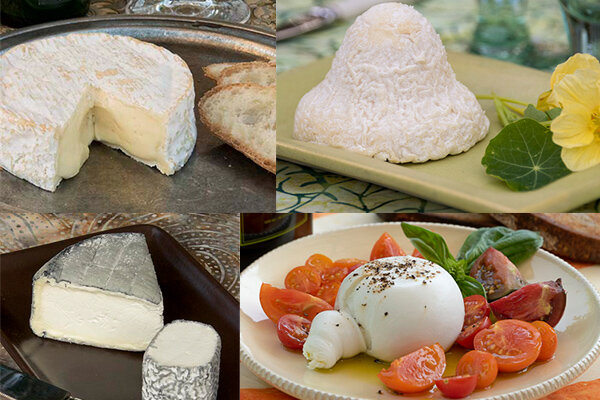Maybe cheese wasn’t the first thing you thought about when President Trump announced a 30-day ban on flights from Europe last week. But cheese is, indeed, a victim. It won’t be getting on planes, either. All those lovely soft spring goat cheeses from the Loire Valley…fresh mozzarella and burrata from Campania…delicate robiolas from Piemonte…these cheeses and many others have effectively had their passports revoked. “Trump said it’s not going to affect cargo, but it doesn’t work that way,” says Stephanie Ciano of World’s Best Cheese, a major importer.
Many cheeses, especially those with short shelf lives, are air-freighted to the U.S. and they don’t come on cargo planes. “Air-freighted cheese comes on passenger flights,” says Ciano, vice president of international purchasing for World’s Best in Somerville, MA. “And airlines are not going to run flights without people.”
Frequent flyer: Mothais sur Feuille
Ciano estimates that the flight ban will cost her company hundreds of thousands of dollars in lost revenue. Guffanti’s baked lemon ricotta, a popular choice for Easter, will be MIA, at least temporarily, along with lightly ripened cheeses like French Couronne de Touraine and Mothais sur Feuille and Italy’s La Tur.
The ban is arguably even more burdensome for Michele Lanza, whose Bay Area-based import and distribution company, Fresca Italia, brings all of its European cheeses by air. (Most other importers get hard cheeses by boat, which is slower but cheaper.) “Our strategy has always been to fly everything,” says Lanza. “Even if it’s a cheese that could go by boat, we’ve always believed that flying is best.”
Like Ciano, Lanza was caught off guard by the President’s announcement. “If we had had this conversation a couple of days ago, it would have been ‘business as usual,’” Lanza told me last Friday. His Italian suppliers were still making cheese and filling orders, exempt, as food producers, from the lockdown devastating other parts of the economy. Last Thursday, the day after the President’s speech, Lanza thought his cheeses might still catch one of the last flights out of Rome. On Friday, he learned they would not.
Ban victim: Michele Lanza
Lanza began scrambling for alternatives, such as flying the cheese out of Heathrow or on a cargo plane, but congestion pricing quickly kicked in. “To give you an idea, the cost per kilo to ship our products would be higher than the cost of the products,” says Lanza. Ciano had the same experience. “There’s a lot of price gouging going on,” says the importer. “The rates are like 350% of what they were.”
To make matters worse, the flight ban comes on top of plunging cheese orders from restaurants as Americans drastically curtail dining out.
“The situation is unprecedented,” says Bob Stonebrook of Aniata Cheese Company, a Southern California-based importer and distributor of fine cheese. Aniata’s European partners are trying to find transport for the perishable cheeses that U.S. shops have ordered, but whatever they arrange will be costly, says Stonebrook.
Ciano is hopeful that the U.S. government will quickly address the flight ban’s collateral damage. In the meantime, Lanza will likely be forced into shipping harder cheeses by boat. As for more fragile cheeses, “we can find alternatives,” says Lanza, “but the cost is going to be outrageous.”
UPDATE (March 16): From Stephanie Ciano: “The situation changes hour by hour. We are working with our freight consolidators to be able to get the freight out. We are going to get our Guffanti shipment and Alta Langa [La Tur and others]. Pomella mozzarella shipments are blocked through mid-April. French and Swiss air shipments are completely blocked. All flights by United Airlines and Air France are canceled between France and the U.S. American Airlines has canceled 75% of its flights and not allowed any cargo. Passengers and their belongings are the priority. Unlikely to arrive: Epoisses Berthaut, Chaource, Munster AOP, Camembert and all fresh French cheeses; from Switzerland, no Moser Truffle, Moser Screamer or Petit Vaccarinus. Hopefully an avenue will open up, but things are looking bleak right now, particularly from France.”



